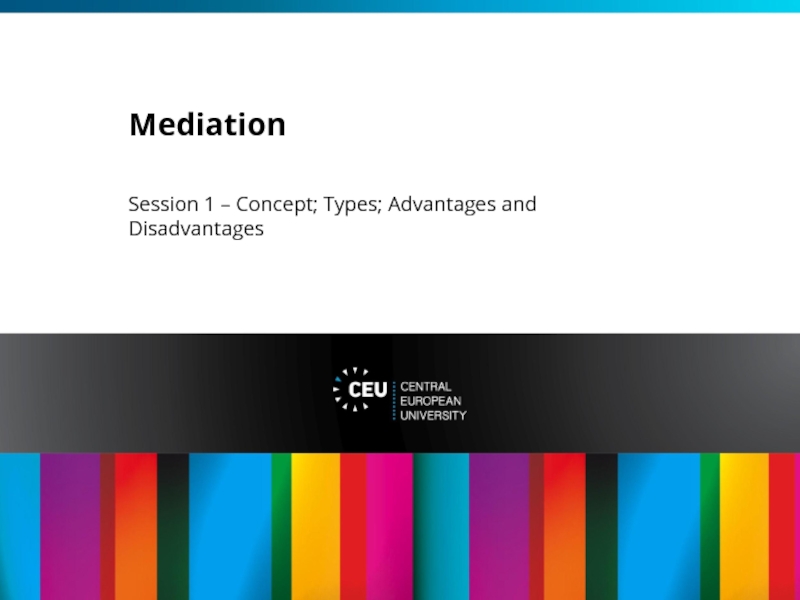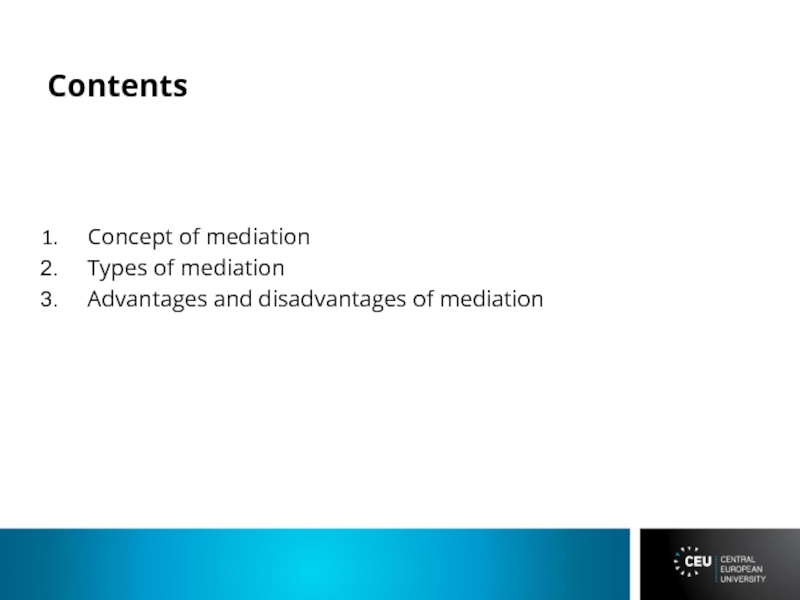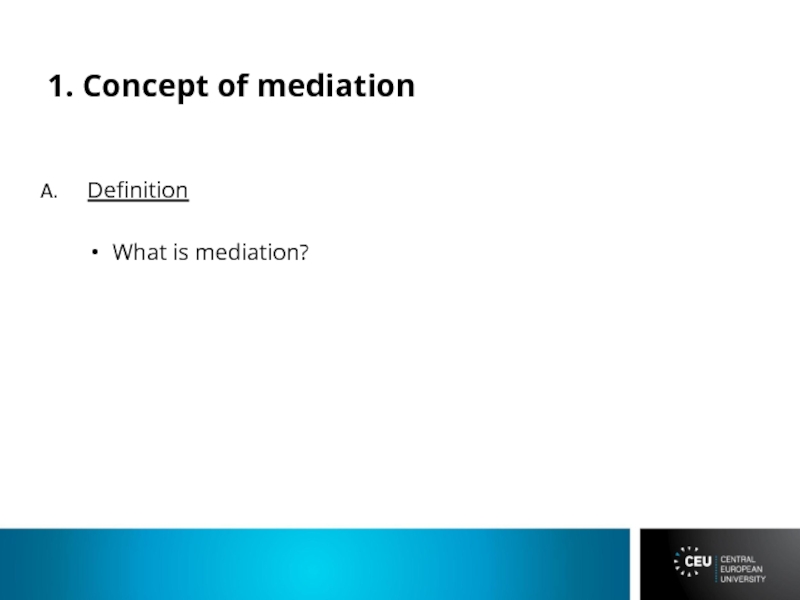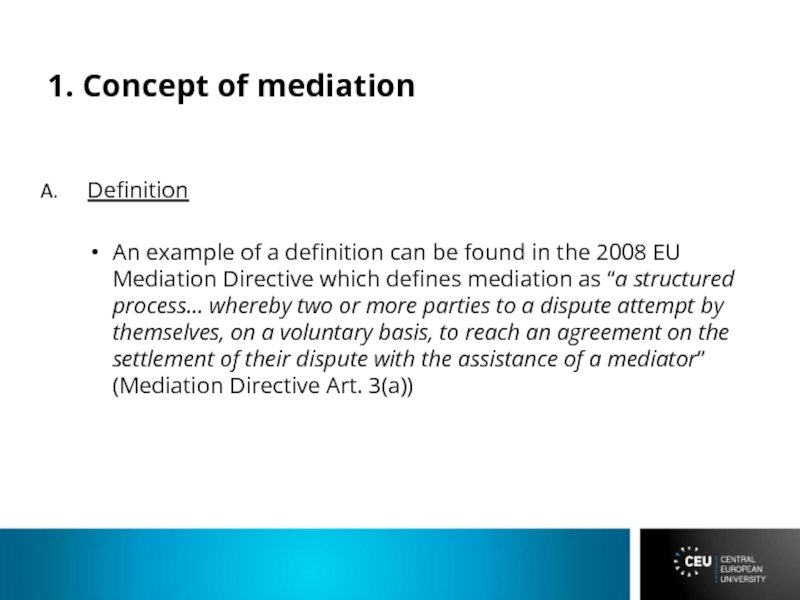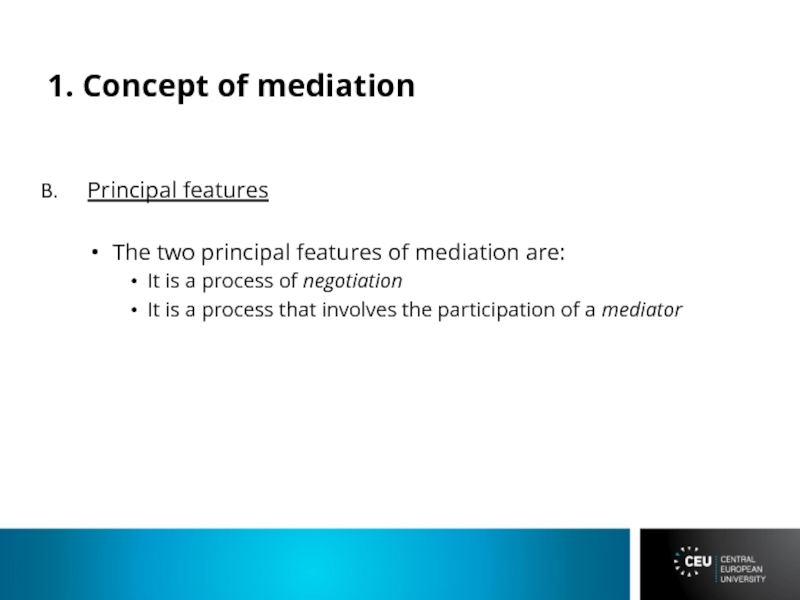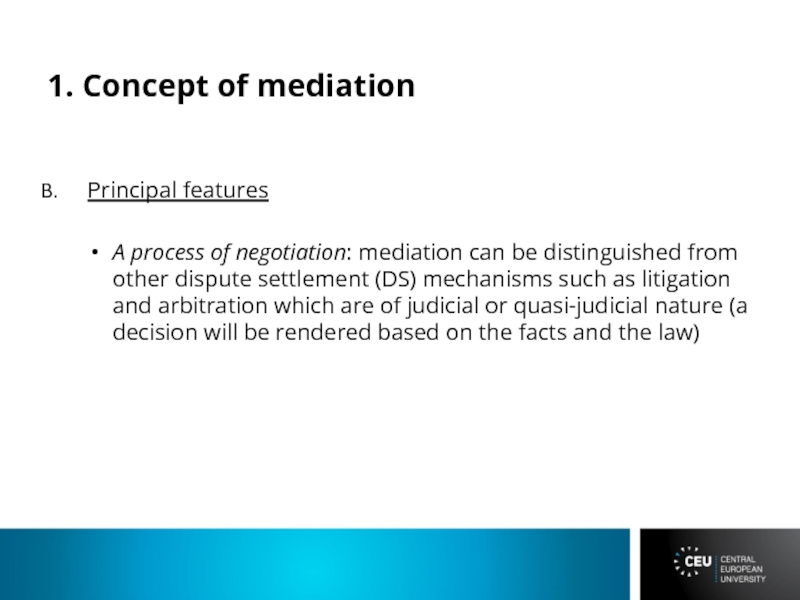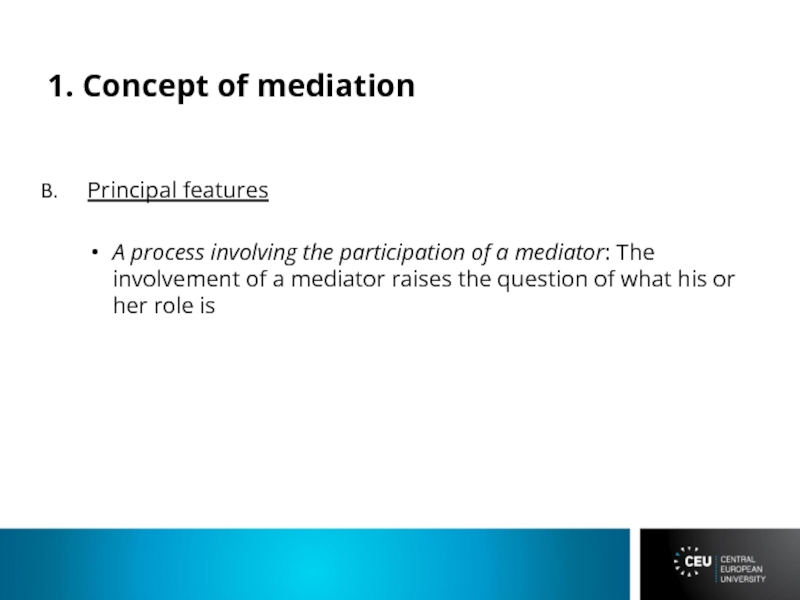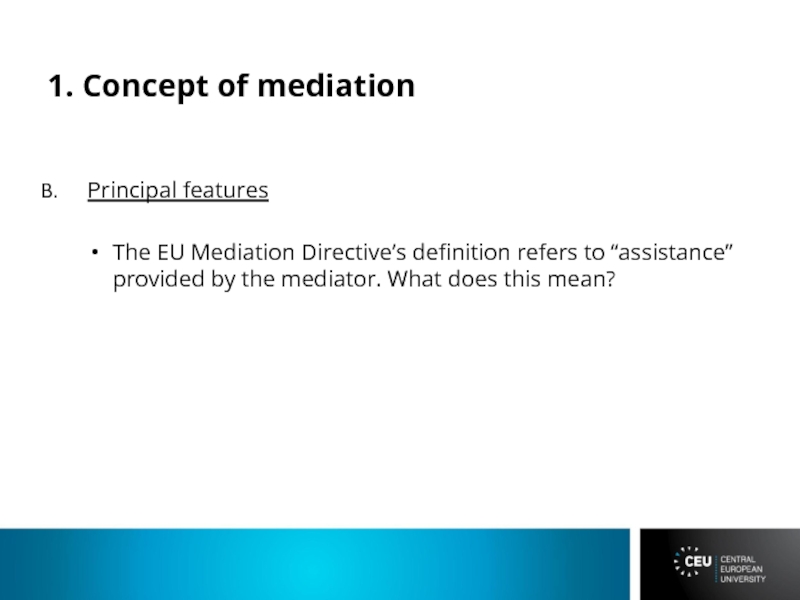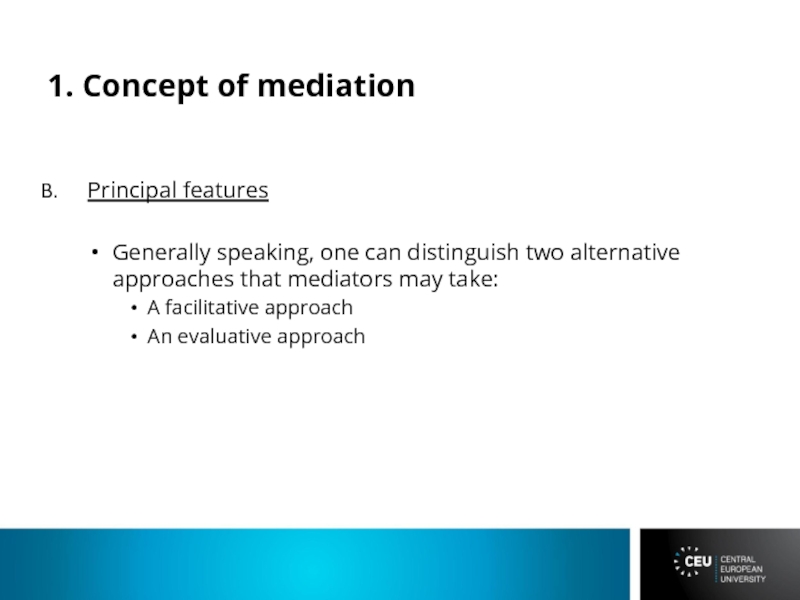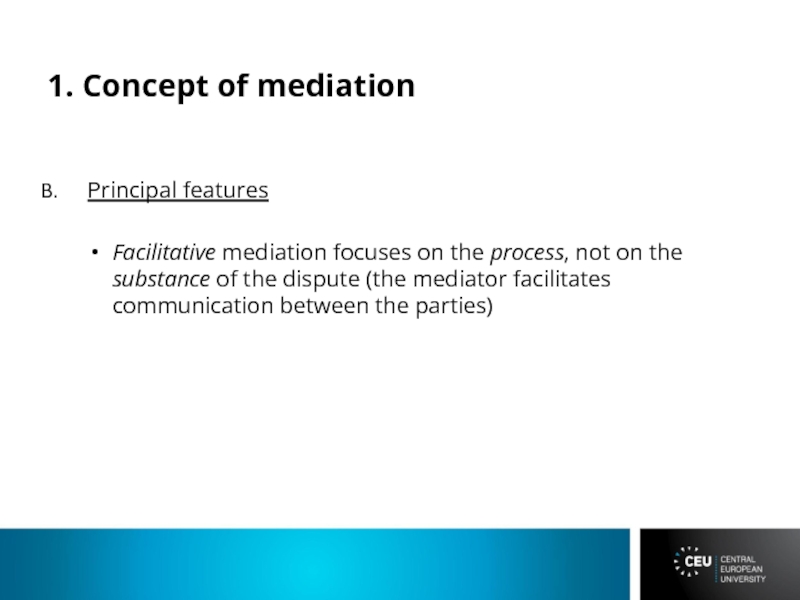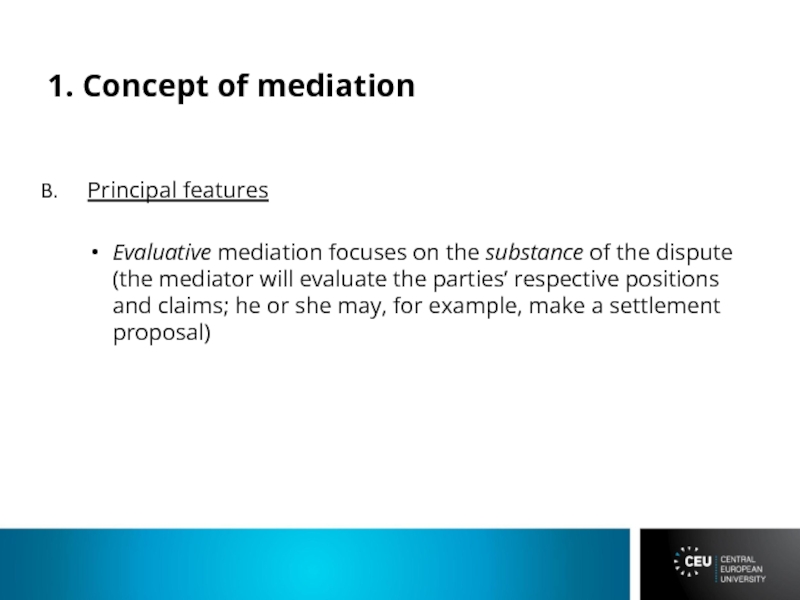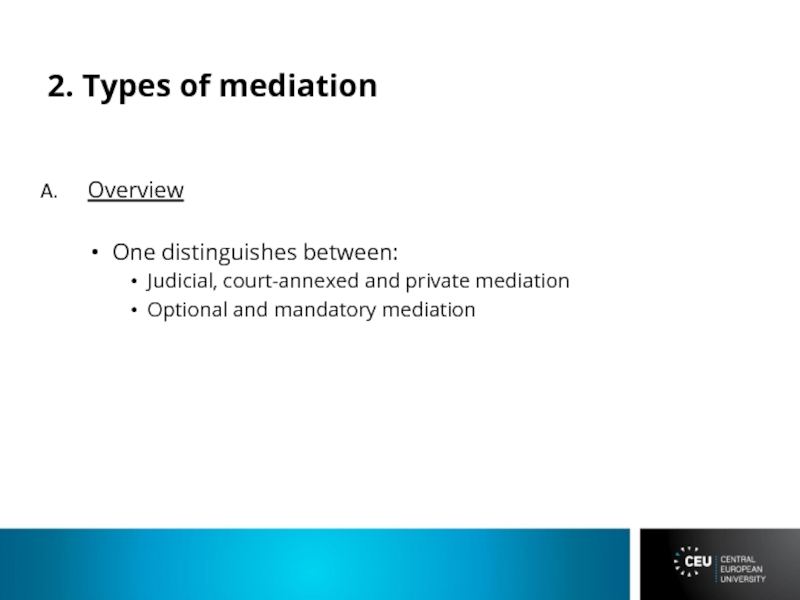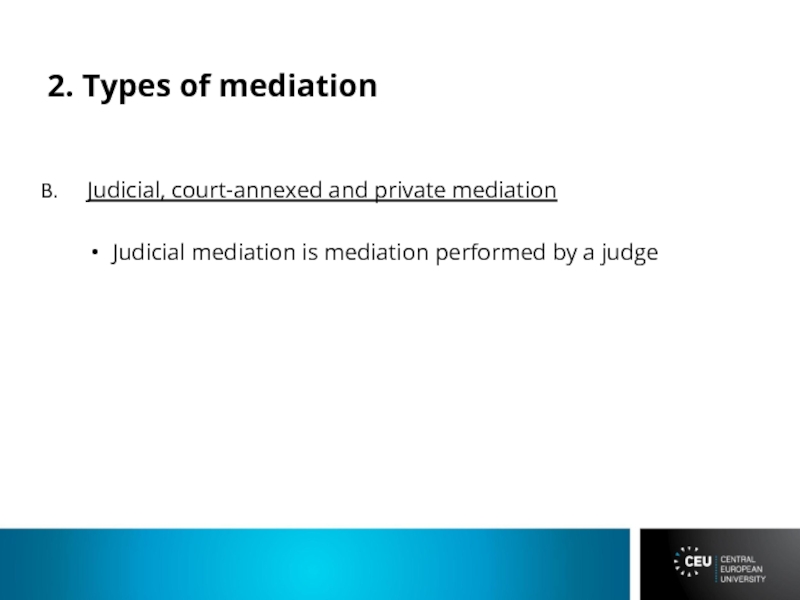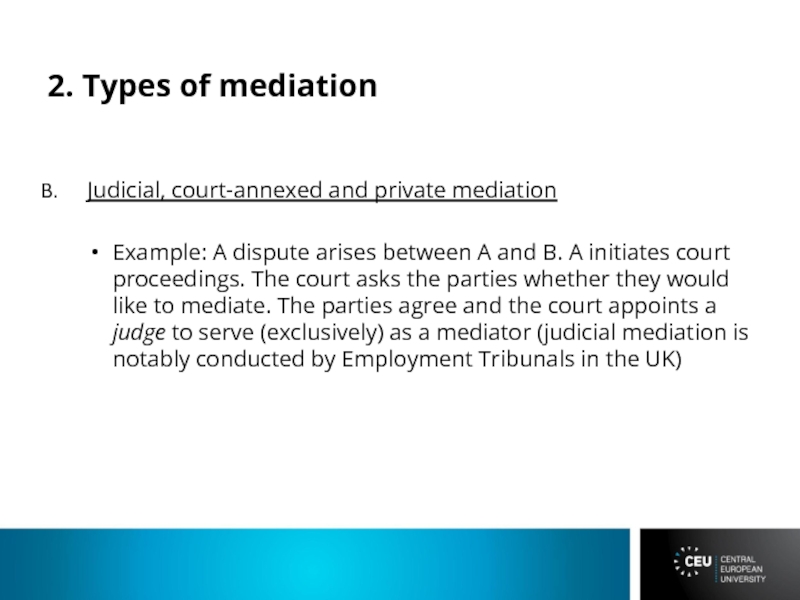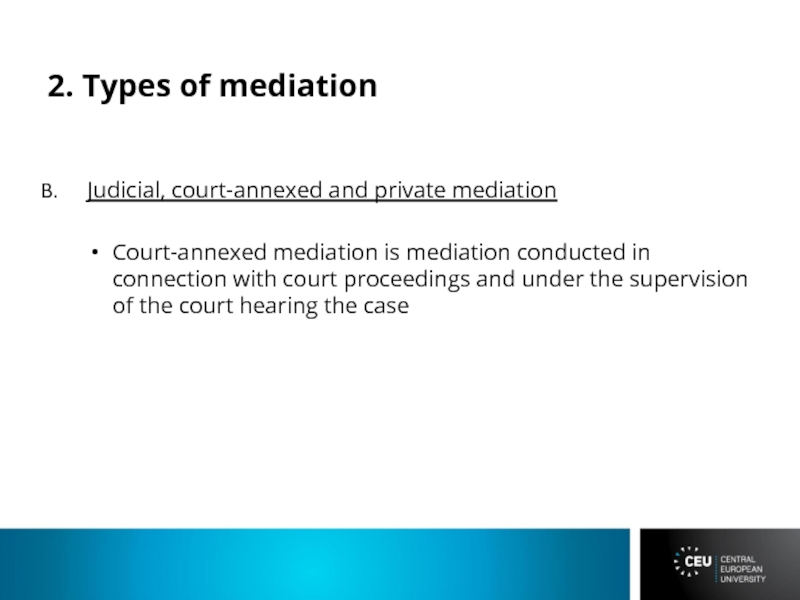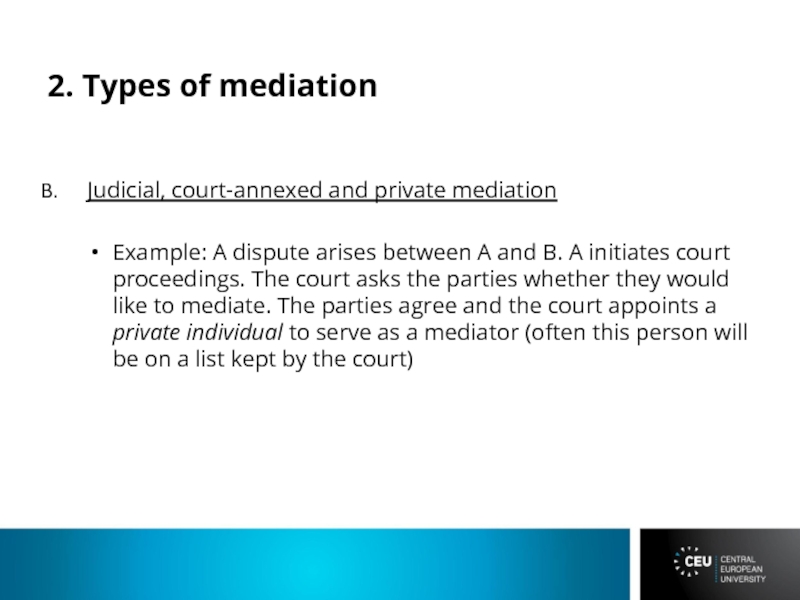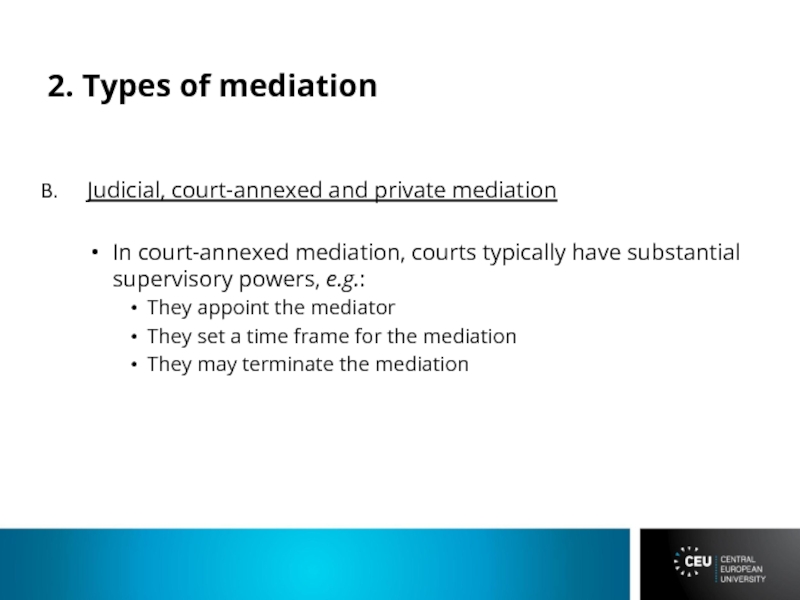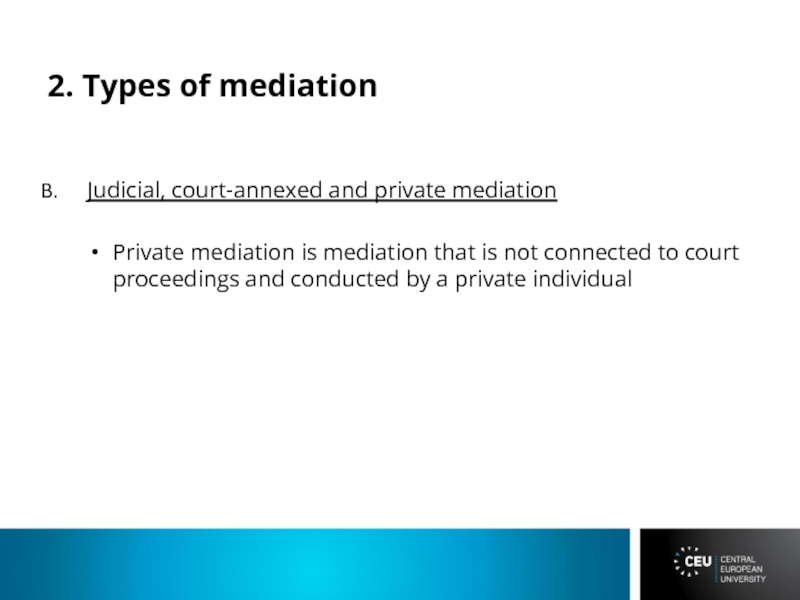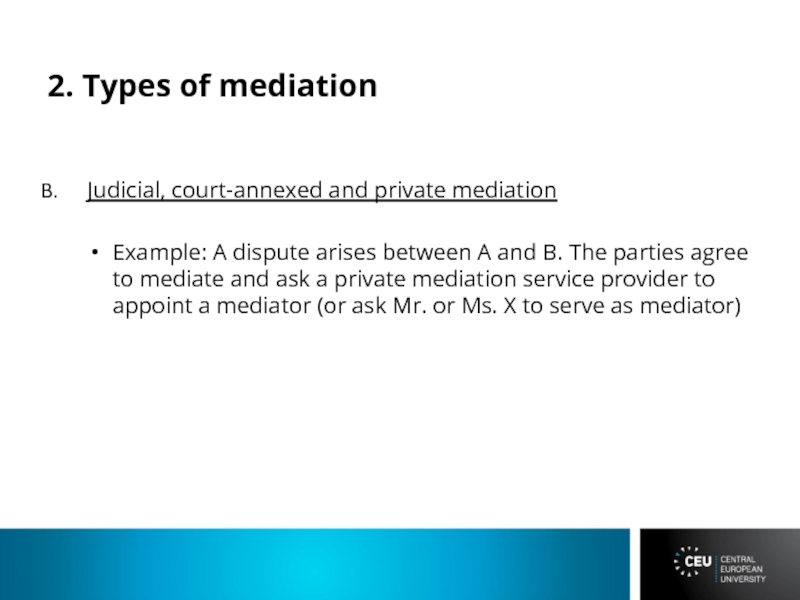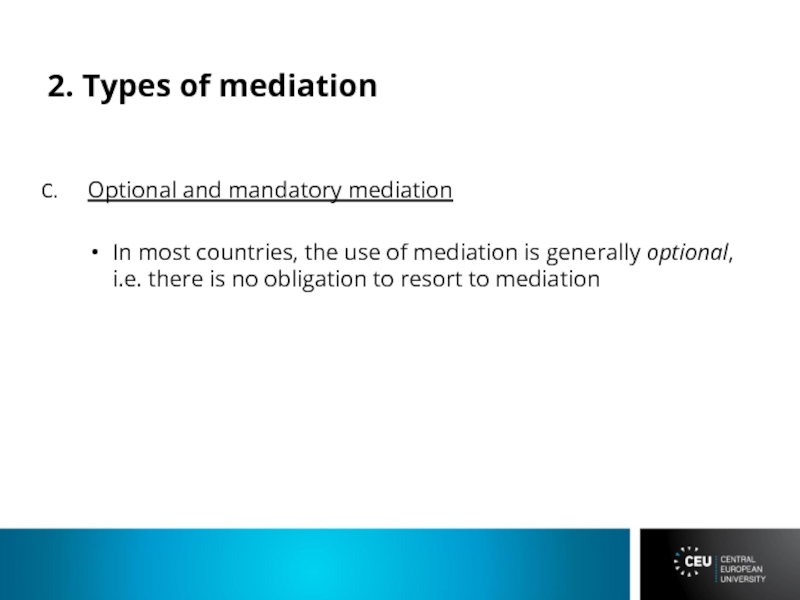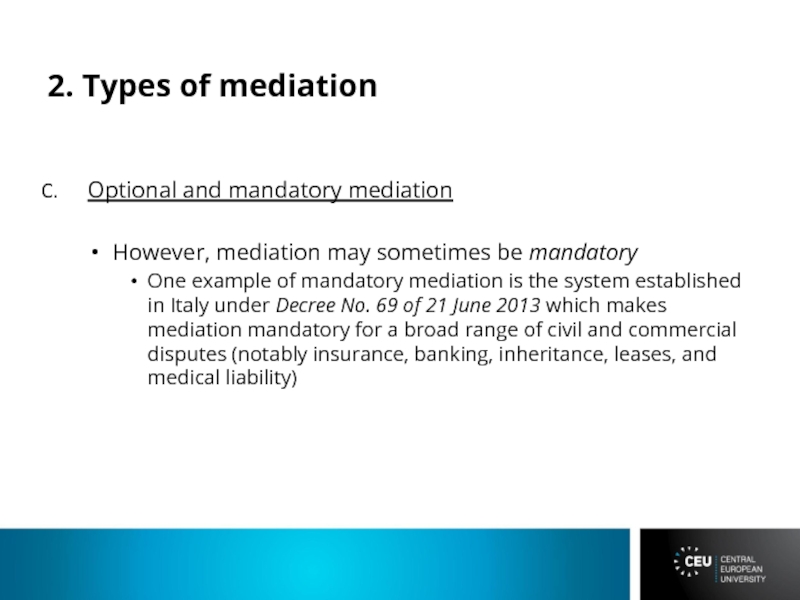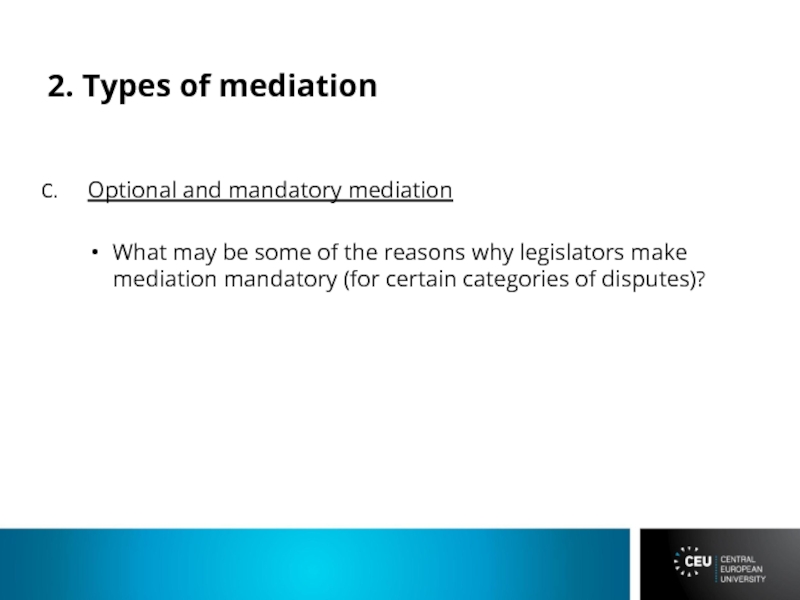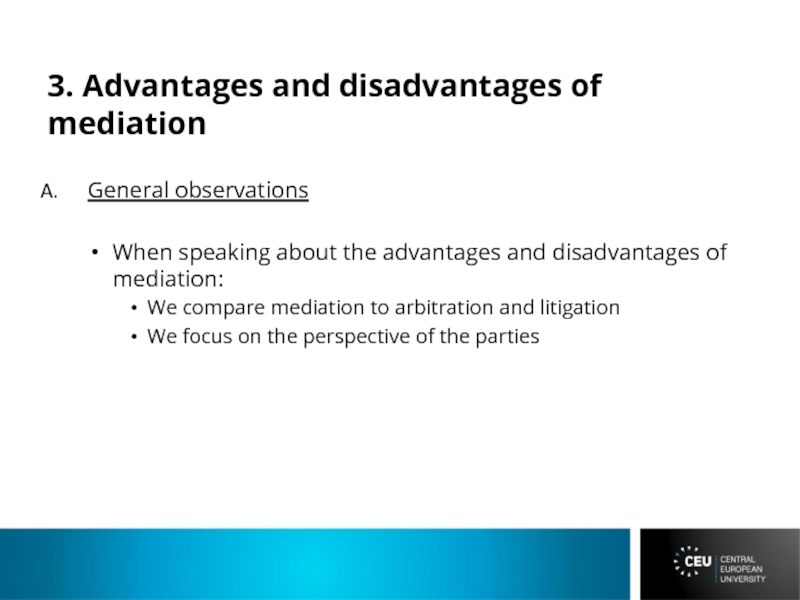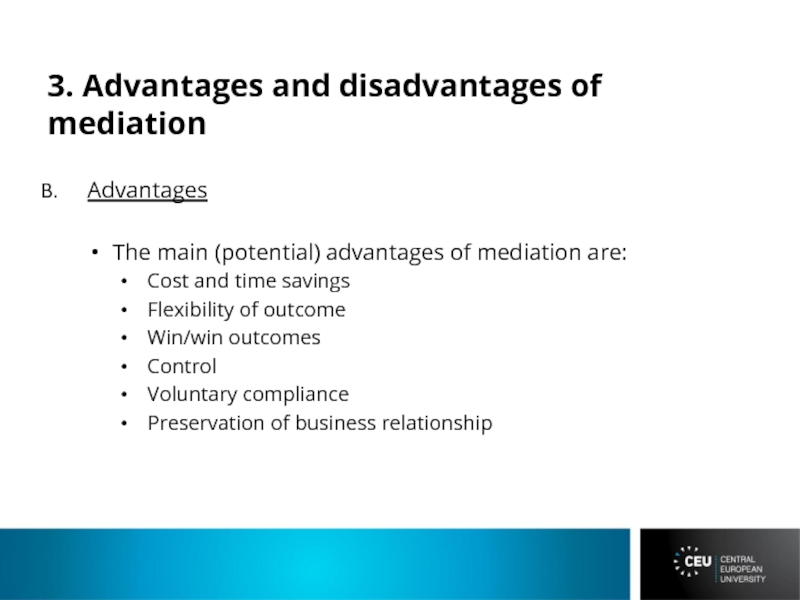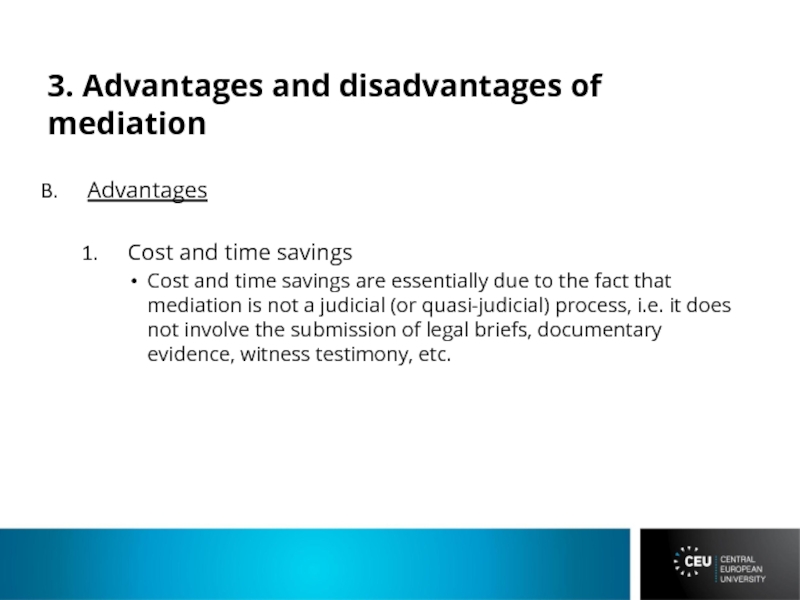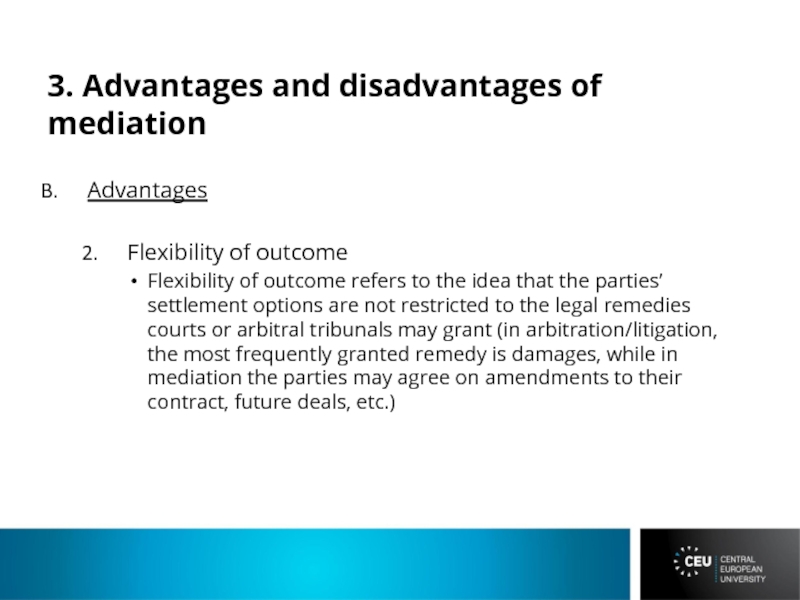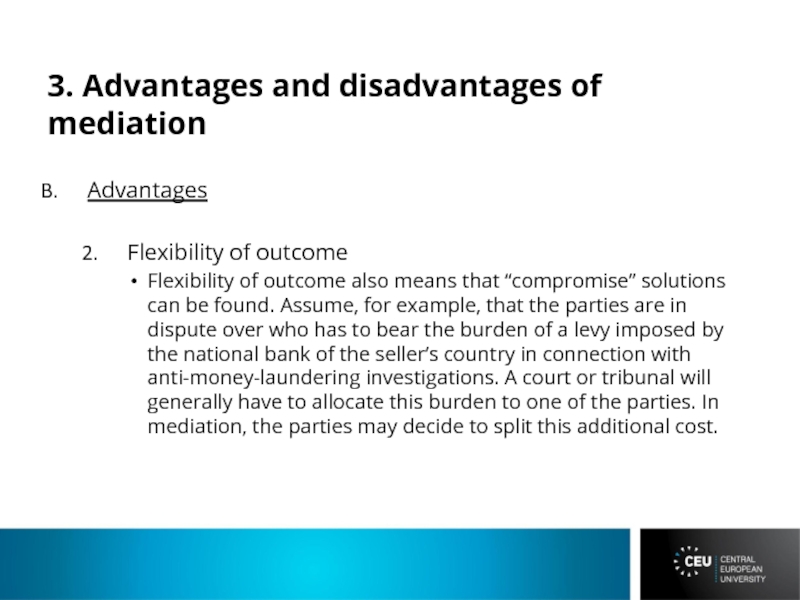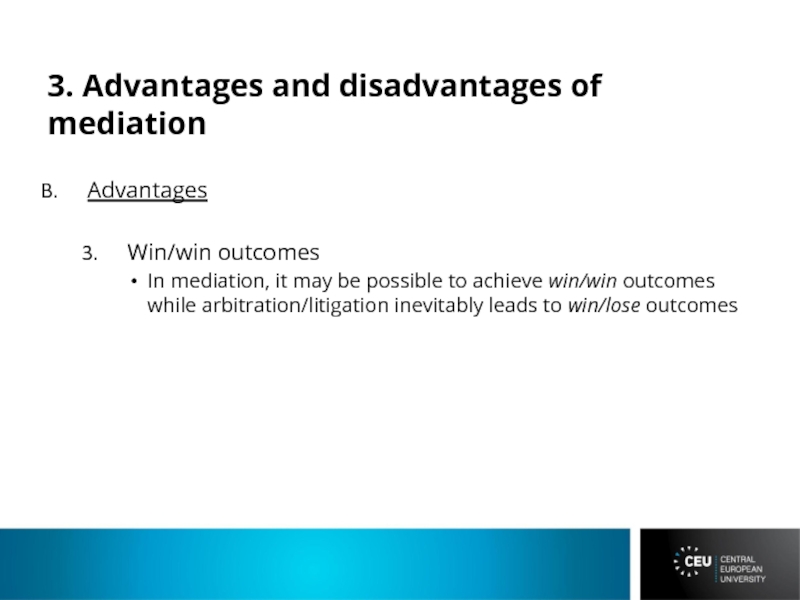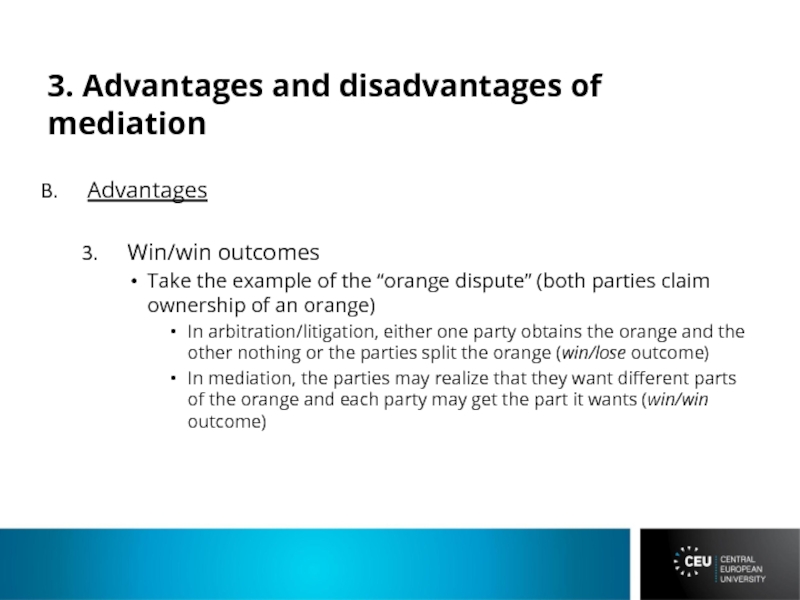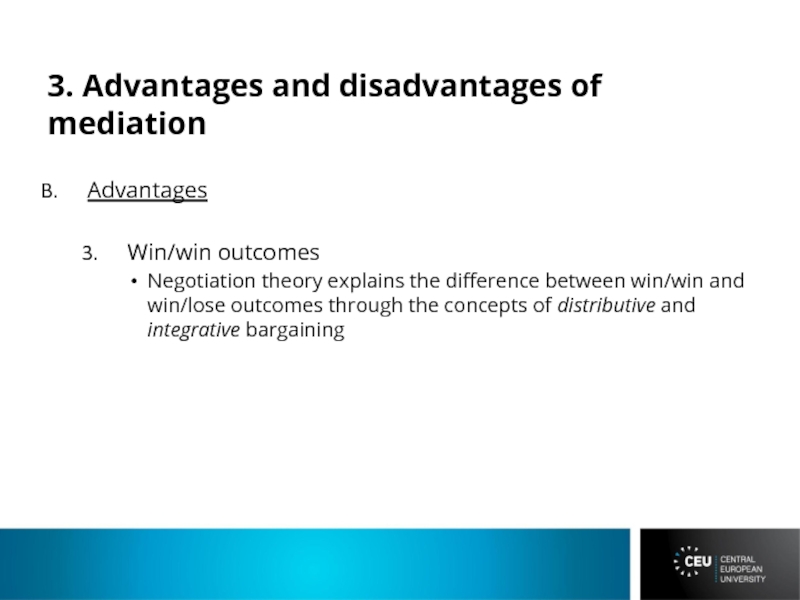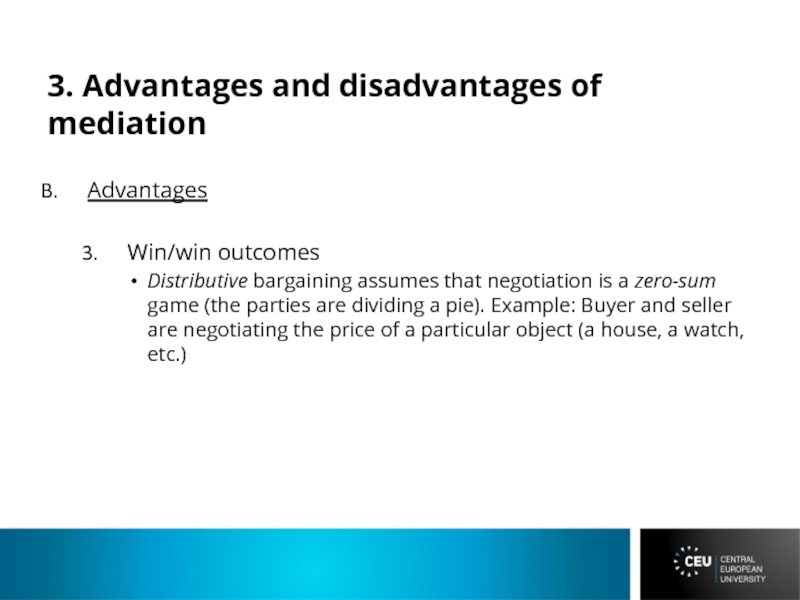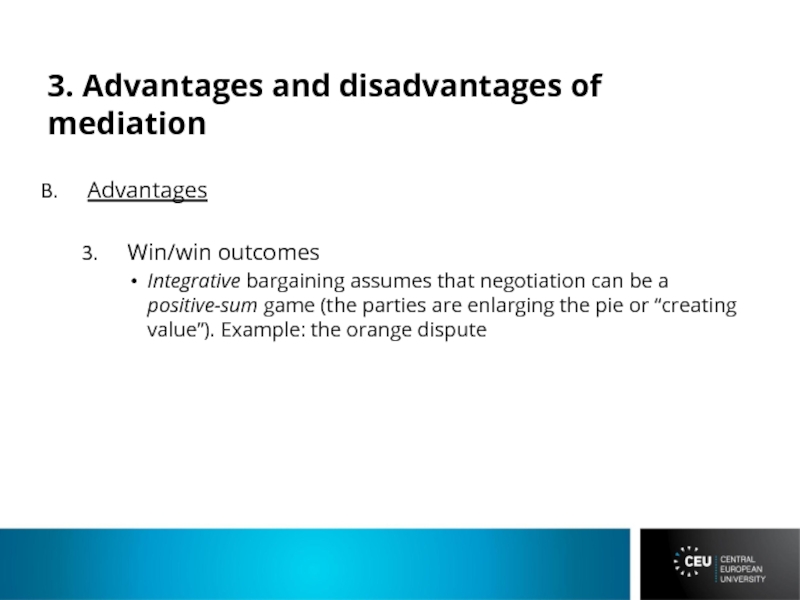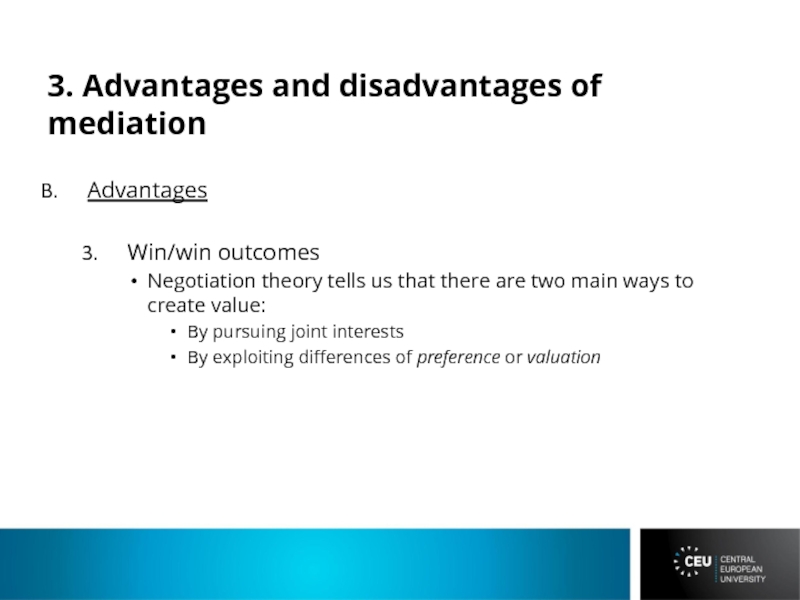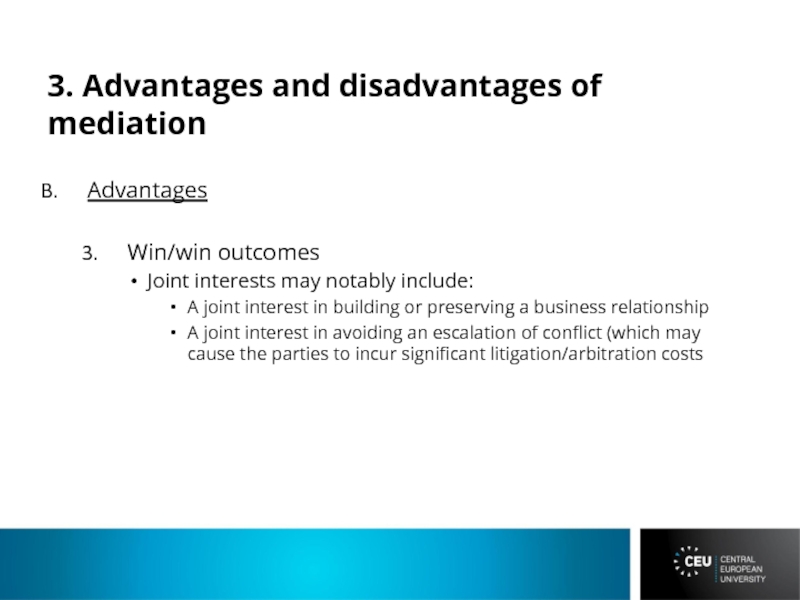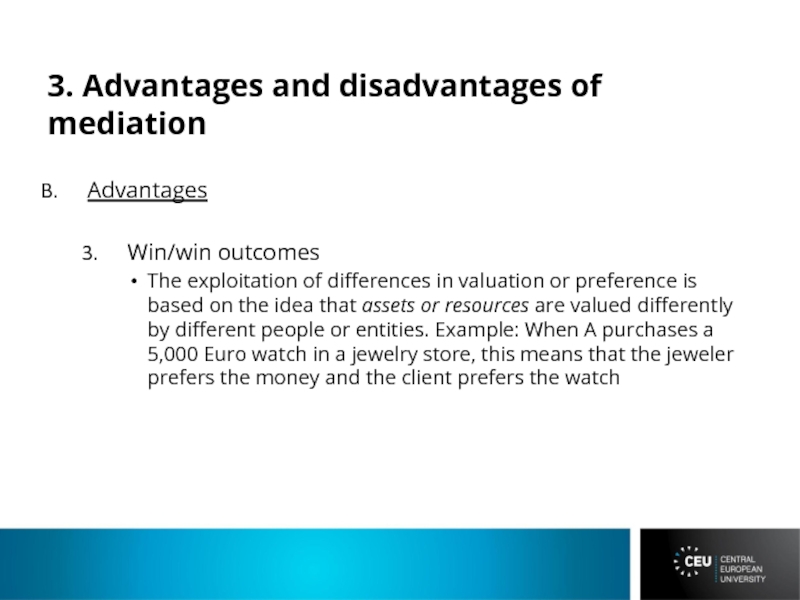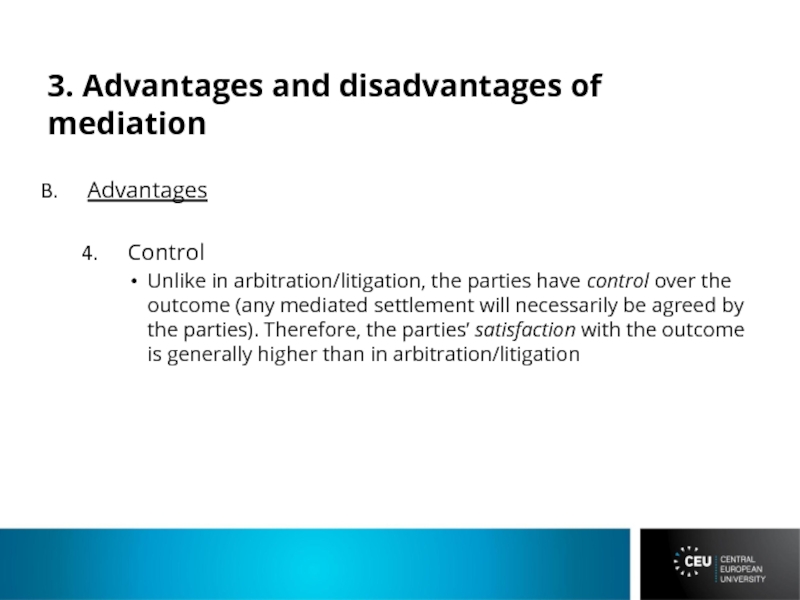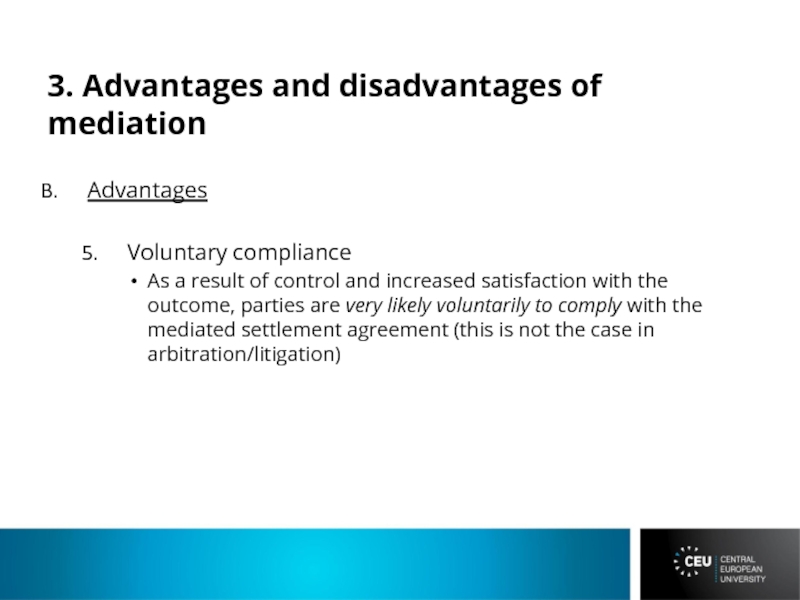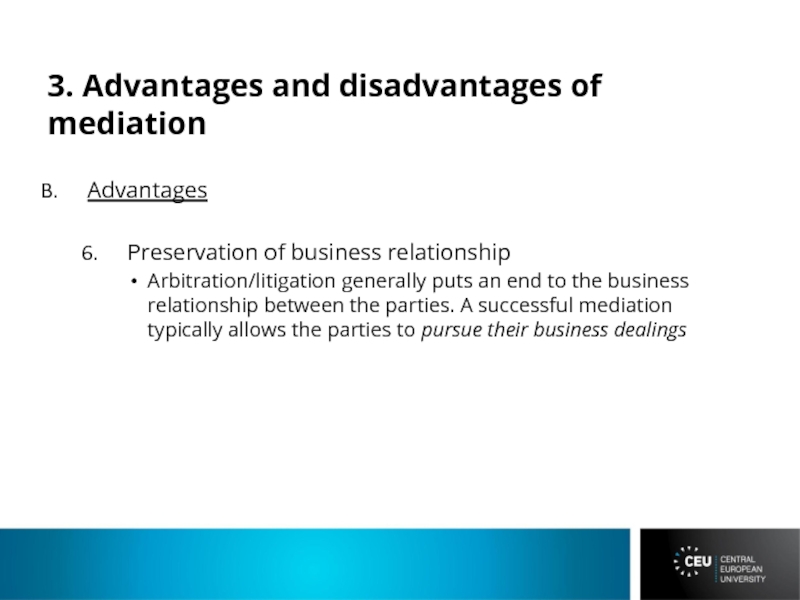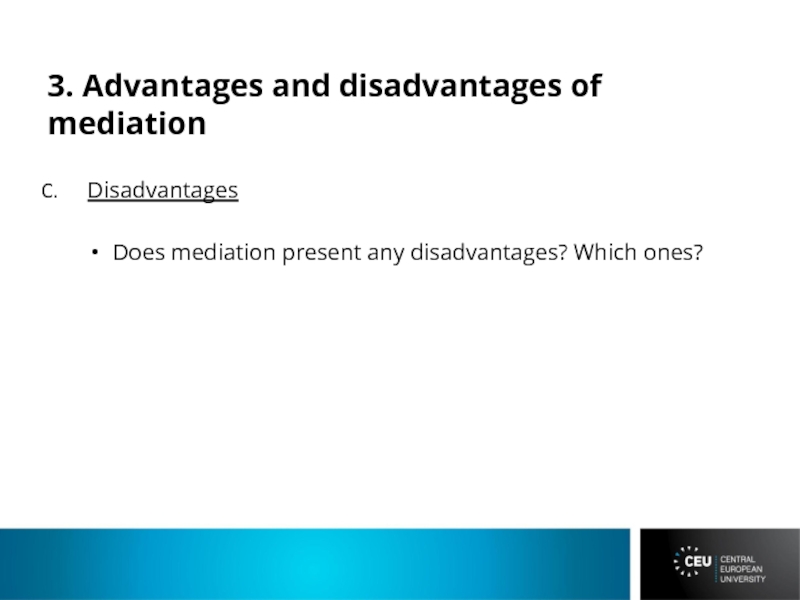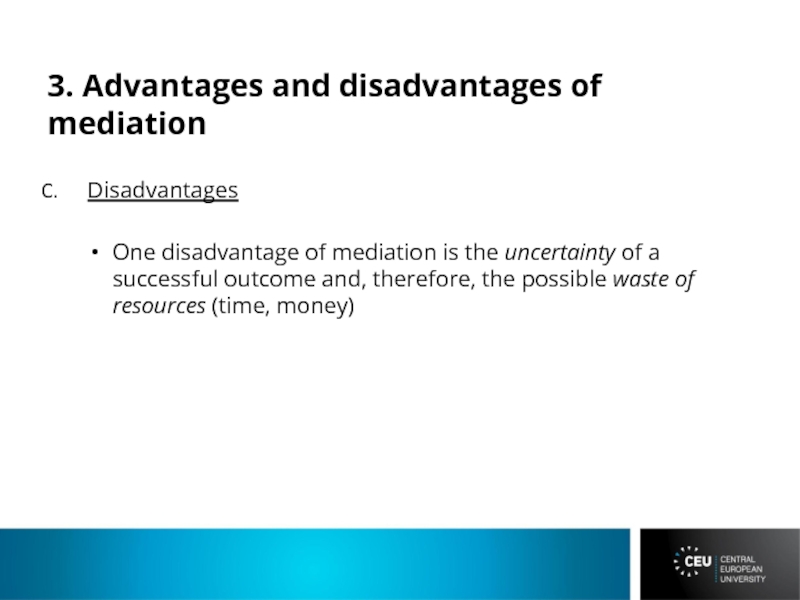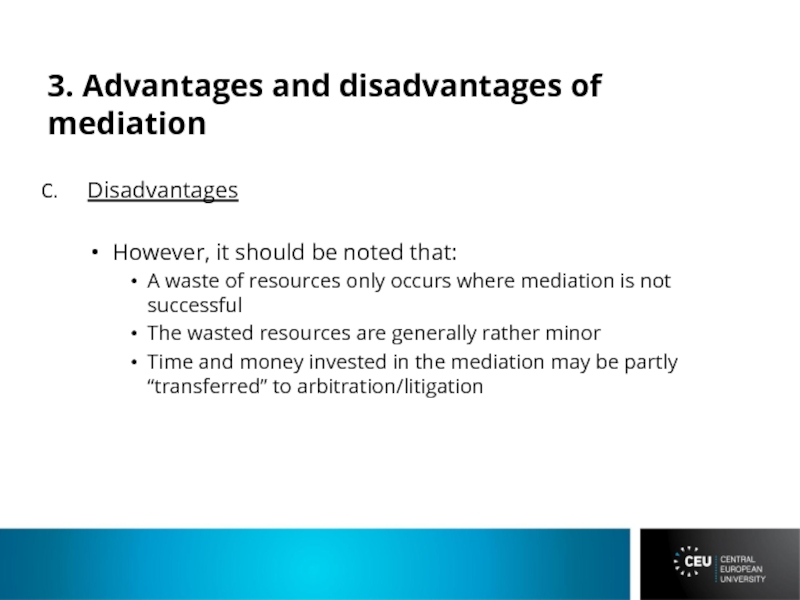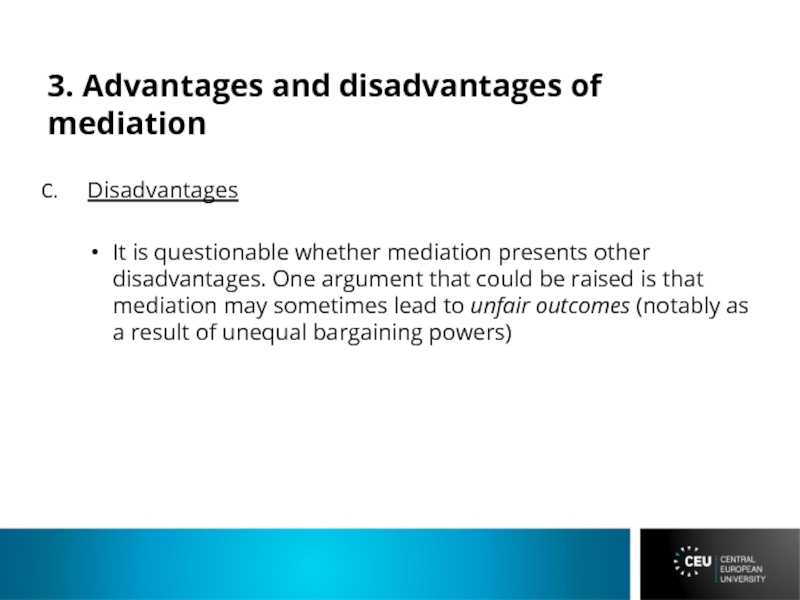- Главная
- Разное
- Дизайн
- Бизнес и предпринимательство
- Аналитика
- Образование
- Развлечения
- Красота и здоровье
- Финансы
- Государство
- Путешествия
- Спорт
- Недвижимость
- Армия
- Графика
- Культурология
- Еда и кулинария
- Лингвистика
- Английский язык
- Астрономия
- Алгебра
- Биология
- География
- Детские презентации
- Информатика
- История
- Литература
- Маркетинг
- Математика
- Медицина
- Менеджмент
- Музыка
- МХК
- Немецкий язык
- ОБЖ
- Обществознание
- Окружающий мир
- Педагогика
- Русский язык
- Технология
- Физика
- Философия
- Химия
- Шаблоны, картинки для презентаций
- Экология
- Экономика
- Юриспруденция
Mediation. Session 1. Concept. Types. Advantages and Disadvantages презентация
Содержание
- 1. Mediation. Session 1. Concept. Types. Advantages and Disadvantages
- 2. Contents Concept of mediation Types of mediation Advantages and disadvantages of mediation
- 3. 1. Concept of mediation Definition What is mediation?
- 4. 1. Concept of mediation Definition
- 5. 1. Concept of mediation Principal features
- 6. 1. Concept of mediation Principal features
- 7. 1. Concept of mediation Principal features
- 8. 1. Concept of mediation Principal features
- 9. 1. Concept of mediation Principal features
- 10. 1. Concept of mediation Principal features
- 11. 1. Concept of mediation Principal features
- 12. 2. Types of mediation Overview
- 13. 2. Types of mediation Judicial, court-annexed
- 14. 2. Types of mediation Judicial, court-annexed
- 15. 2. Types of mediation Judicial, court-annexed
- 16. 2. Types of mediation Judicial, court-annexed
- 17. 2. Types of mediation Judicial, court-annexed
- 18. 2. Types of mediation Judicial, court-annexed
- 19. 2. Types of mediation Judicial, court-annexed
- 20. 2. Types of mediation Optional and
- 21. 2. Types of mediation Optional and
- 22. 2. Types of mediation Optional and
- 23. 3. Advantages and disadvantages of mediation
- 24. 3. Advantages and disadvantages of mediation
- 25. 3. Advantages and disadvantages of mediation
- 26. 3. Advantages and disadvantages of mediation
- 27. 3. Advantages and disadvantages of mediation
- 28. 3. Advantages and disadvantages of mediation
- 29. 3. Advantages and disadvantages of mediation
- 30. 3. Advantages and disadvantages of mediation
- 31. 3. Advantages and disadvantages of mediation
- 32. 3. Advantages and disadvantages of mediation
- 33. 3. Advantages and disadvantages of mediation
- 34. 3. Advantages and disadvantages of mediation
- 35. 3. Advantages and disadvantages of mediation
- 36. 3. Advantages and disadvantages of mediation
- 37. 3. Advantages and disadvantages of mediation
- 38. 3. Advantages and disadvantages of mediation
- 39. 3. Advantages and disadvantages of mediation
- 40. 3. Advantages and disadvantages of mediation
- 41. 3. Advantages and disadvantages of mediation
- 42. 3. Advantages and disadvantages of mediation
- 43. 3. Advantages and disadvantages of mediation
- 44. 3. Advantages and disadvantages of mediation
Слайд 41. Concept of mediation
Definition
An example of a definition can be found
in the 2008 EU Mediation Directive which defines mediation as “a structured process… whereby two or more parties to a dispute attempt by themselves, on a voluntary basis, to reach an agreement on the settlement of their dispute with the assistance of a mediator” (Mediation Directive Art. 3(a))
Слайд 51. Concept of mediation
Principal features
The two principal features of mediation are:
It
is a process of negotiation
It is a process that involves the participation of a mediator
It is a process that involves the participation of a mediator
Слайд 61. Concept of mediation
Principal features
A process of negotiation: mediation can be
distinguished from other dispute settlement (DS) mechanisms such as litigation and arbitration which are of judicial or quasi-judicial nature (a decision will be rendered based on the facts and the law)
Слайд 71. Concept of mediation
Principal features
A process involving the participation of a
mediator: The involvement of a mediator raises the question of what his or her role is
Слайд 81. Concept of mediation
Principal features
The EU Mediation Directive’s definition refers to
“assistance” provided by the mediator. What does this mean?
Слайд 91. Concept of mediation
Principal features
Generally speaking, one can distinguish two alternative
approaches that mediators may take:
A facilitative approach
An evaluative approach
A facilitative approach
An evaluative approach
Слайд 101. Concept of mediation
Principal features
Facilitative mediation focuses on the process, not
on the substance of the dispute (the mediator facilitates communication between the parties)
Слайд 111. Concept of mediation
Principal features
Evaluative mediation focuses on the substance of
the dispute (the mediator will evaluate the parties’ respective positions and claims; he or she may, for example, make a settlement proposal)
Слайд 122. Types of mediation
Overview
One distinguishes between:
Judicial, court-annexed and private mediation
Optional and
mandatory mediation
Слайд 132. Types of mediation
Judicial, court-annexed and private mediation
Judicial mediation is mediation
performed by a judge
Слайд 142. Types of mediation
Judicial, court-annexed and private mediation
Example: A dispute arises
between A and B. A initiates court proceedings. The court asks the parties whether they would like to mediate. The parties agree and the court appoints a judge to serve (exclusively) as a mediator (judicial mediation is notably conducted by Employment Tribunals in the UK)
Слайд 152. Types of mediation
Judicial, court-annexed and private mediation
Court-annexed mediation is mediation
conducted in connection with court proceedings and under the supervision of the court hearing the case
Слайд 162. Types of mediation
Judicial, court-annexed and private mediation
Example: A dispute arises
between A and B. A initiates court proceedings. The court asks the parties whether they would like to mediate. The parties agree and the court appoints a private individual to serve as a mediator (often this person will be on a list kept by the court)
Слайд 172. Types of mediation
Judicial, court-annexed and private mediation
In court-annexed mediation, courts
typically have substantial supervisory powers, e.g.:
They appoint the mediator
They set a time frame for the mediation
They may terminate the mediation
They appoint the mediator
They set a time frame for the mediation
They may terminate the mediation
Слайд 182. Types of mediation
Judicial, court-annexed and private mediation
Private mediation is mediation
that is not connected to court proceedings and conducted by a private individual
Слайд 192. Types of mediation
Judicial, court-annexed and private mediation
Example: A dispute arises
between A and B. The parties agree to mediate and ask a private mediation service provider to appoint a mediator (or ask Mr. or Ms. X to serve as mediator)
Слайд 202. Types of mediation
Optional and mandatory mediation
In most countries, the use
of mediation is generally optional, i.e. there is no obligation to resort to mediation
Слайд 212. Types of mediation
Optional and mandatory mediation
However, mediation may sometimes be
mandatory
One example of mandatory mediation is the system established in Italy under Decree No. 69 of 21 June 2013 which makes mediation mandatory for a broad range of civil and commercial disputes (notably insurance, banking, inheritance, leases, and medical liability)
One example of mandatory mediation is the system established in Italy under Decree No. 69 of 21 June 2013 which makes mediation mandatory for a broad range of civil and commercial disputes (notably insurance, banking, inheritance, leases, and medical liability)
Слайд 222. Types of mediation
Optional and mandatory mediation
What may be some of
the reasons why legislators make mediation mandatory (for certain categories of disputes)?
Слайд 233. Advantages and disadvantages of mediation
General observations
When speaking about the advantages
and disadvantages of mediation:
We compare mediation to arbitration and litigation
We focus on the perspective of the parties
We compare mediation to arbitration and litigation
We focus on the perspective of the parties
Слайд 243. Advantages and disadvantages of mediation
Advantages
The main (potential) advantages of mediation
are:
Cost and time savings
Flexibility of outcome
Win/win outcomes
Control
Voluntary compliance
Preservation of business relationship
Cost and time savings
Flexibility of outcome
Win/win outcomes
Control
Voluntary compliance
Preservation of business relationship
Слайд 253. Advantages and disadvantages of mediation
Advantages
Cost and time savings
Cost and time
savings are essentially due to the fact that mediation is not a judicial (or quasi-judicial) process, i.e. it does not involve the submission of legal briefs, documentary evidence, witness testimony, etc.
Слайд 263. Advantages and disadvantages of mediation
Advantages
Flexibility of outcome
Flexibility of outcome refers
to the idea that the parties’ settlement options are not restricted to the legal remedies courts or arbitral tribunals may grant (in arbitration/litigation, the most frequently granted remedy is damages, while in mediation the parties may agree on amendments to their contract, future deals, etc.)
Слайд 273. Advantages and disadvantages of mediation
Advantages
Flexibility of outcome
Flexibility of outcome also
means that “compromise” solutions can be found. Assume, for example, that the parties are in dispute over who has to bear the burden of a levy imposed by the national bank of the seller’s country in connection with anti-money-laundering investigations. A court or tribunal will generally have to allocate this burden to one of the parties. In mediation, the parties may decide to split this additional cost.
Слайд 283. Advantages and disadvantages of mediation
Advantages
Win/win outcomes
In mediation, it may be
possible to achieve win/win outcomes while arbitration/litigation inevitably leads to win/lose outcomes
Слайд 293. Advantages and disadvantages of mediation
Advantages
Win/win outcomes
Take the example of the
“orange dispute” (both parties claim ownership of an orange)
In arbitration/litigation, either one party obtains the orange and the other nothing or the parties split the orange (win/lose outcome)
In mediation, the parties may realize that they want different parts of the orange and each party may get the part it wants (win/win outcome)
In arbitration/litigation, either one party obtains the orange and the other nothing or the parties split the orange (win/lose outcome)
In mediation, the parties may realize that they want different parts of the orange and each party may get the part it wants (win/win outcome)
Слайд 303. Advantages and disadvantages of mediation
Advantages
Win/win outcomes
Negotiation theory explains the difference
between win/win and win/lose outcomes through the concepts of distributive and integrative bargaining
Слайд 313. Advantages and disadvantages of mediation
Advantages
Win/win outcomes
Distributive bargaining assumes that negotiation
is a zero-sum game (the parties are dividing a pie). Example: Buyer and seller are negotiating the price of a particular object (a house, a watch, etc.)
Слайд 323. Advantages and disadvantages of mediation
Advantages
Win/win outcomes
Integrative bargaining assumes that negotiation
can be a positive-sum game (the parties are enlarging the pie or “creating value”). Example: the orange dispute
Слайд 333. Advantages and disadvantages of mediation
Advantages
Win/win outcomes
How to enlarge the pie?
How to create value?
Слайд 343. Advantages and disadvantages of mediation
Advantages
Win/win outcomes
Negotiation theory tells us that
there are two main ways to create value:
By pursuing joint interests
By exploiting differences of preference or valuation
By pursuing joint interests
By exploiting differences of preference or valuation
Слайд 353. Advantages and disadvantages of mediation
Advantages
Win/win outcomes
Joint interests may notably include:
A
joint interest in building or preserving a business relationship
A joint interest in avoiding an escalation of conflict (which may cause the parties to incur significant litigation/arbitration costs
A joint interest in avoiding an escalation of conflict (which may cause the parties to incur significant litigation/arbitration costs
Слайд 363. Advantages and disadvantages of mediation
Advantages
Win/win outcomes
The exploitation of differences in
valuation or preference is based on the idea that assets or resources are valued differently by different people or entities. Example: When A purchases a 5,000 Euro watch in a jewelry store, this means that the jeweler prefers the money and the client prefers the watch
Слайд 373. Advantages and disadvantages of mediation
Advantages
Win/win outcomes
Example: A and B enter
into a joint venture agreement to jointly run a business requiring substantial investments. A and B share losses and profits in equal parts (50/50). It turns out that A is very risk-averse, while B is very risk-friendly. What different financial arrangement may be in the mutual interest of the parties (a win/win change)?
Слайд 383. Advantages and disadvantages of mediation
Advantages
Control
Unlike in arbitration/litigation, the parties have
control over the outcome (any mediated settlement will necessarily be agreed by the parties). Therefore, the parties’ satisfaction with the outcome is generally higher than in arbitration/litigation
Слайд 393. Advantages and disadvantages of mediation
Advantages
Voluntary compliance
As a result of control
and increased satisfaction with the outcome, parties are very likely voluntarily to comply with the mediated settlement agreement (this is not the case in arbitration/litigation)
Слайд 403. Advantages and disadvantages of mediation
Advantages
Preservation of business relationship
Arbitration/litigation generally puts
an end to the business relationship between the parties. A successful mediation typically allows the parties to pursue their business dealings
Слайд 413. Advantages and disadvantages of mediation
Disadvantages
Does mediation present any disadvantages? Which
ones?
Слайд 423. Advantages and disadvantages of mediation
Disadvantages
One disadvantage of mediation is the
uncertainty of a successful outcome and, therefore, the possible waste of resources (time, money)
Слайд 433. Advantages and disadvantages of mediation
Disadvantages
However, it should be noted that:
A
waste of resources only occurs where mediation is not successful
The wasted resources are generally rather minor
Time and money invested in the mediation may be partly “transferred” to arbitration/litigation
The wasted resources are generally rather minor
Time and money invested in the mediation may be partly “transferred” to arbitration/litigation
Слайд 443. Advantages and disadvantages of mediation
Disadvantages
It is questionable whether mediation presents
other disadvantages. One argument that could be raised is that mediation may sometimes lead to unfair outcomes (notably as a result of unequal bargaining powers)
